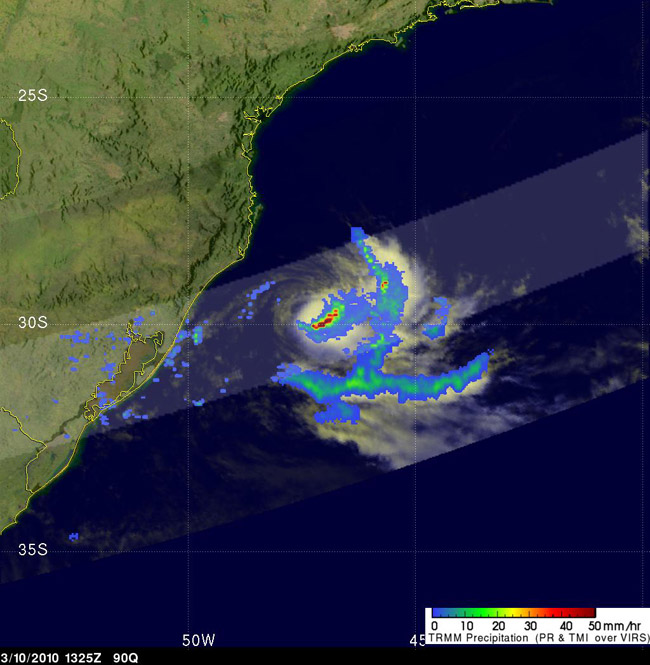Second Tropical Cyclone Ever Forms in South Atlantic

The second ever tropical cyclone to form in the South Atlantic has been spotted about 180 miles off the coast of Brazil.
Tropical cyclones typically don't form in the Southern Atlantic because the waters are usually too cool.
However, forecasters at the Naval Research Laboratory noted on Tuesday that a low pressure system off the coast of Brazil appeared to have tropical storm-force winds. The storm has been dubbed Tropical Storm 90Q.
The first known South Atlantic tropical cyclone (the collective name for tropical storms, hurricanes and typhoons) was seen in 2004 and called "Catarina."
"The only other tropical cyclone known to have occurred in the Southern Atlantic Ocean developed in March, 2004," said Hal Pierce, meteorologist on the TRMM satellite team at NASA's Goddard Space Flight Center in Greenbelt, Md. "That's when a hurricane called "Catarina" made landfall on March 28, 2004 near the town of Torres in the southern Brazilian state of Santa Catarina (thus, the storm's name). It was the first "hurricane" ever observed by satellite in the south Atlantic."
While tropical cyclones in the Northern Hemisphere spin counterclockwise, those in the Southern Hemisphere spin clockwise.
Two NASA satellites have now confirmed that the storm is moving away from Brazil's coast.
Get the world’s most fascinating discoveries delivered straight to your inbox.
At 0845 UTC (3:45 a.m. ET) today, Tropical Storm 90Q had maximum sustained winds near 46 mph (40 knots). It was located about 325 miles east of Puerto Alegre, Brazil in the waters of the South Atlantic Ocean near 30.0 South latitude and 45.8 West longitude.
Tropical Storm 90Q will continue moving in a general easterly direction away from the Brazilian coast and weaken before being absorbed by a mid-latitude cold front this weekend, meteorologists predict.
Hurricane season in the North Atlantic basin and Caribbean officially begins on June 1.
 Live Science Plus
Live Science Plus






